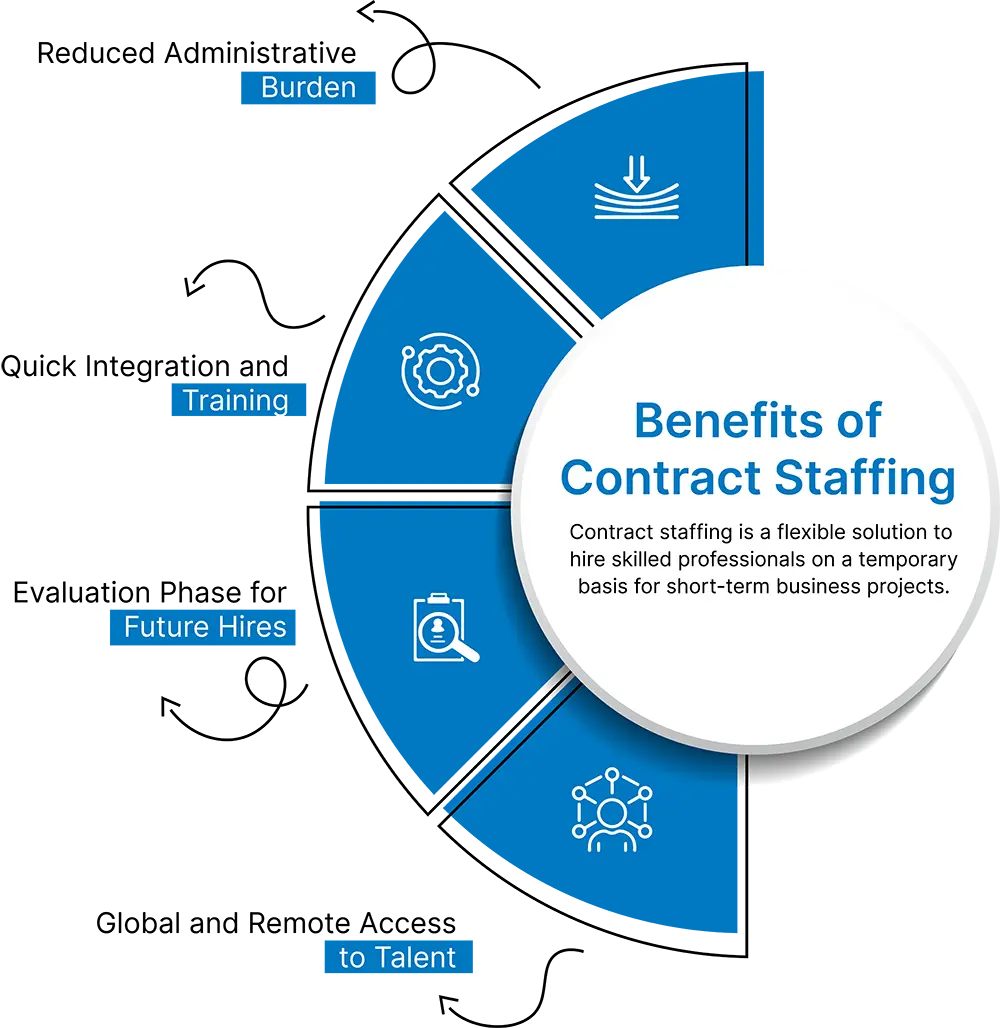Considering the continuous change in market demands, successful companies are moving to contract staffing as a flexible, effective way to bring in skilled talent. By choosing contract professionals, organizations can rapidly hire the expertise required without the obligations of long-term hiring. This approach not only allows companies to scale up or down with agility but also supports their drive for innovation by connecting them with specialized skill sets.
This blog will let you explore why contract staffing has become a strategic choice for talent onboarding and the benefits it brings to companies.
What is Contract Staffing?
Contract staffing enables companies to quickly onboard specialized talent for short-term projects or specific skill needs without the long-term costs of full-time hires.
Contract staffing is a flexible hiring model that allows companies to bring in specialized talent for specific projects or timeframes, often with the support of staffing agencies. Unlike traditional full-time roles, contract positions are typically fixed-term and designed to address short-term needs or specialized skill gaps. This model empowers companies to hire and retain qualified professionals quickly, maintaining focus on key business priorities without the overhead costs associated with permanent employees. Contract staffing can be offered in different models, such as Contract-to-Hire (C2H), Corp-to-Corp (C2C), and Gig Workforce, providing tailored solutions to meet diverse business needs.
Why Companies are Opting for Contract Staffing?
- Flexibility and Scalability: Contract staffing allows companies to increase or decrease their workforce based on project requirements. When workloads increase, organizations can hire contract staff to meet their demand and then reduce headcount when projects conclude. This flexibility helps manage resources effectively without long-term commitments.
- Cost-Effectiveness: Hiring full-time employees involves considerable costs, including salaries, benefits, training, and infrastructure. With contract staffing, companies can minimize these costs, as contract staff often receive limited or no benefits, saving on other operational expenses. This cost-effectiveness allows companies to utilize resources more efficiently across projects.
- Access to Specialized Talent: Many projects require particular skills or experience that may not be available within the team they have. Contract staffing allows companies to onboard professionals with specialized skills quickly. For example, an IT company needing a cybersecurity expert for a new project can hire a skilled contractor rather than spend time and resources in training an already existing team member.
- Faster Hiring Process: The contract staffing model speeds up the hiring process, as hiring agencies can quickly take in pre-screened talent. This rapid onboarding reduces the time it takes for companies to start with the projects, ensuring they can meet tight deadlines and achieve business objectives without delay.
- Adaptability to Market Changes: Market trends change, and companies need to stay updated. Contract staffing provides the agility to bring in additional resources during peak times or specialized roles for existing projects. This flexibility helps businesses maintain productivity and meet project goals, regardless of changes in the market.
Benefits of Contract Staffing for Talent Onboarding
- Reduced Administrative Burden: Talent acquisitions often handle much of the recruitment, screening, and payroll management for contract workers. This, in turn, reduces the administrative workload on HR teams, allowing them to focus on other core activities while ensuring compliance and efficient onboarding.
- Quick Integration and Training: Contract professionals are often accustomed to fast-paced environments and are quick to adapt to new roles. Their experience and skills enable them to merge effortlessly into projects, providing value from day one. This is particularly advantageous for short-term or immediate projects where rapid onboarding is important.
- Evaluation Phase for Future Hires: Many companies see contract roles as a “trial period” for potential full-time employees. Contract positions allow managers to evaluate a worker’s performance, cultural fit, and skill level before offering a full-time role. This approach reduces the risk associated with full-time hiring and promotes a well-equipped team.
- Global and Remote Access to Talent: Contract staffing also expands the talent pool by allowing companies to hire remote or international contractors for specialized projects. This access to global talent brings diversity and expertise that may not be readily available locally.

Challenges of Contract Staffing and How to Overcome Them
While contract staffing offers many benefits, it also has its challenges:
- Worker Engagement: Contract workers may feel less engaged with the company culture. Companies can include contractors in team meetings, thus giving them an inclusive environment that encourages open communication.
- Continuity and Knowledge Transfer: Contractors may leave when their contract ends, which can impact project continuity. Documenting workflows and implementing knowledge transfer protocols can mitigate this risk.
- Inconsistent Quality and Skills Alignment: Contract workers may have different skill levels, which can lead to mixed work quality. To address this, companies can tie up with the best staffing agencies, conduct detailed interviews, and review work samples to ensure contractors meet project needs.
- Limited Long-Term Investment in Company Goals: Contractors may focus only on their tasks, which can affect motivation and alignment with company goals. To address this, assign a mentor or project lead to connect their work to broader objectives and provide regular feedback.
Conclusion
Contract staffing has become a powerful tool for successful companies aiming to streamline talent onboarding. This approach provides access to specialized skills, reduces costs, and enhances workforce agility, all of which are important in today’s fast-changing business environment. By choosing contract staffing, companies can stay competitive and responsive while focusing on growth.
Empower Your Future with the Right Talent! Reach Out to Us Today!

